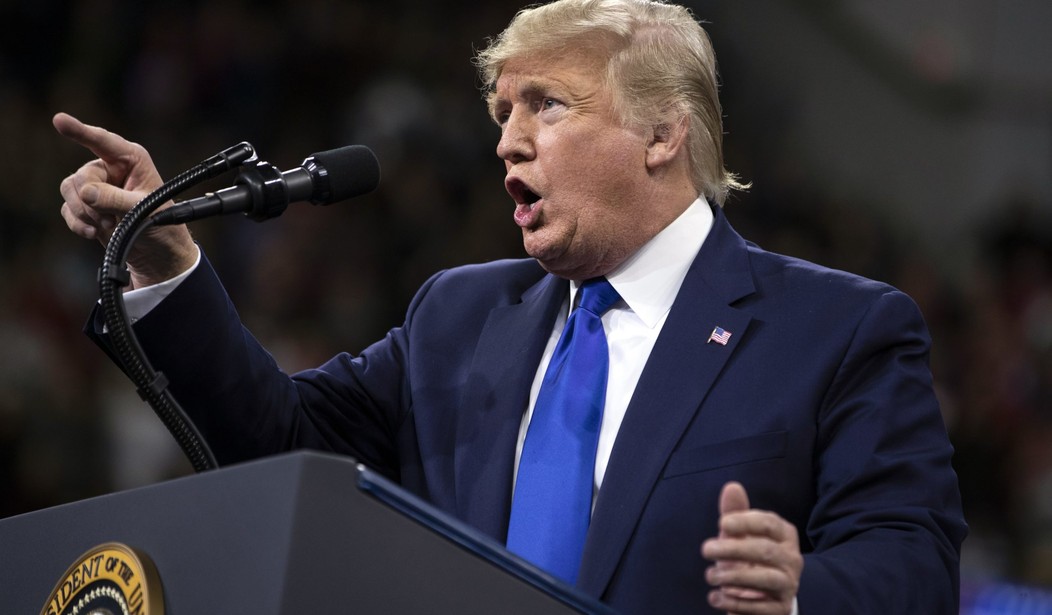President Donald Trump’s re-election campaign filed a libel lawsuit against The New York Times on Wednesday, accusing America’s newspaper of record of defamation in an article claiming that Trump’s 2016 campaign had an “overarching deal” with Russia regardless of the fact that Special Counsel Robert Mueller found no evidence of collusion.
“Today the President’s re-election campaign filed suit against the New York Times for falsely stating the Campaign had an ‘overarching deal’ with ‘Vladimir Putin’s oligarchy’ to ‘help the campaign against Hillary Clinton’ in exchange for ‘a new pro-Russian foreign policy, starting with relief from … economic sanctions,'” Jenna Ellis, senior legal aid to the Trump campaign, said in a statement.
“The statements were and are 100 percent false and defamatory. The complaint alleges The Times was aware of the falsity at the time it published them, but did so for the intentional purpose of hurting the campaign, while misleading its own readers in the process,” she insisted.
The article in question, “The Real Trump-Russia Quid Pro Quo,” an op-ed by Max Frankel (executive editor of The Times from 1986 to 1994), claimed that there was a clear deal between Trump and Russia.
“There was no need for detailed electoral collusion between the Trump campaign and Vladimir Putin’s oligarchy because they had an overarching deal: the quid of help in the campaign against Hillary Clinton for the quo of a new pro-Russian foreign policy, starting with relief from the Obama administration’s burdensome economic sanctions,” Frankel wrote. “The Trumpites knew about the quid and held out the prospect of the quo.”
The lawsuit explains that this article is entirely false.
“The Defamatory Article does not allege or refer to any proof of its claims of a ‘quid pro quo’ or ‘deal’ between the Campaign and Russia. Rather, the Defamatory Article selectively refers to previously-reported contacts between a Russian lawyer and persons connected with the Campaign. The Defamatory Article, however, insinuates that these contacts must have resulted in a quid pro quo or a deal, and the Defamatory Article does not acknowledge that, in fact, there had been extensive reporting, including in The Times, that the meetings and contacts that the Defamatory Article refers to did not result in any quid pro quo or deal between the Campaign and Russia, or anyone connected with either of them,” the lawsuit explains.
“The Times’ story is false. The falsity of the story has been confirmed by Special Counsel Robert Mueller’s Report on the Investigation into Russian Interference in the 2016 Presidential Election released on or about April 18, 2019 (the “Mueller Report”), and many other published sources, that there was no conspiracy between the Campaign and Russia in connection with the 2016 United States Presidential Election, or otherwise,” the campaign’s lawsuit argues.
The First Amendment defends freedom of speech and freedom of the press, but there are limits to both. Defamation of character is one such exception, although it has been highly limited by the Supreme Court decision New York Times v. Sullivan (1964). In the case of alleged defamation against a public figure like the Trump campaign, the campaign would have to prove malicious intent and a reckless disregard for the truth.
The lawsuit cites evidence of bias against the Trump campaign and claims both maliciousness and that reckless disregard.
“There is extensive evidence that The Times is extremely biased against the Campaign, and against Republicans in general. This evidence includes, among other things, the fact that The Times has endorsed the Democrat in every United States presidential election of the past sixty (60) years. Also, Max Frankel, the author of the Defamatory Article, described himself in an interview as ‘a Democrat with a vengeance,'” the filing states.
“The Times obviously had a malicious motive, and also acted with reckless disregard for the truth. Extensive information, including stories in The Times published before the Defamatory Article, had put The Times and the world on notice that there was no conspiracy between the Campaign and the Russian government, and there was no ‘quid pro quo’ or ‘deal’ between them,” the lawsuit argues. “Moreover, extensive information, including stories in The Times published before the Defamatory Article, established that, at most, there had been isolated contacts between individual Russians and some persons associated with the Campaign, which did not result in any ‘deal’ or ‘quid pro quo.'”
It is important to note that the Trump campaign, not President Donald Trump himself, filed this lawsuit. The organization, not the president himself — in neither his personal nor his official capacity — is bringing this legal action against The Times.
The New York Times is currently facing another defamation lawsuit, albeit a far less high profile one. Immigration hawk and VDARE founder Peter Brimelow sued The Times for defamation after it echoed the Southern Poverty Law Center’s claim that he is an “open white nationalist,” in contrast to its own journalistic ethics.
Tyler O’Neil is the author of Making Hate Pay: The Corruption of the Southern Poverty Law Center. Follow him on Twitter at @Tyler2ONeil.









Join the conversation as a VIP Member